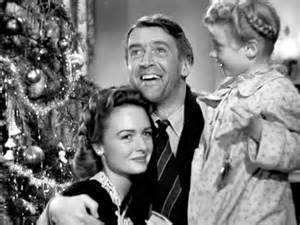
09 Dec It Really Is “A Wonderful Life”
Nary has a Christmas season gone by without watching “It’s a Wonderful Life”, the classic film in which Jimmy Stewart plays a normal, struggling guy who learns the value of his life by seeing what the world would be without him. I know of no other movie that so deftly sends the message of the season. But it is probably my favorite overall move of all time.
Perhaps my love for the film results, in part, from the times and ways it impacted me personally.
I first saw this movie in Denmark, with Danish subtitles. All of the LDS missionaries from around the country were gathered to lend a little cheer just before Christmas. The mission president set up the projector (yes, this was long before DVDs and Netflix), and let us escape from the pain of being rejected, yelled at and spat upon for a couple of hours.
While I had only been in Denmark a short time I had already had plenty of experience with the “typical” response to our invitation to hear a message about the Savior: “I don’t want to hear a (blankity-blank) message about Christ; this is Christmas!” (always followed by the slam of the door). I actually laughed at the irony of that statement the first couple of times, but I was no longer laughing. It made my stomach hurt and my eyes sting, and I secretly wondered at times if I was in the wrong place, or if I just wasn’t good enough to effectively share this most important of messages.
I really didn’t want to see a movie; my heart was breaking eight thousand miles from home and with very little success to show from my efforts to make others’ lives better. But I certainly related to Jimmy Stewart’s George Bailey, who had the best of intentions, but whose efforts were thwarted by no fault of his own.
I’ll try not to spoil the film for those who have not seen it, but let it suffice to say that it turned my attention back to the very reason I had surrendered a portion of my life to knock on doors in a foreign land and share my appreciation for one who gave his life that we might all live.
The second time I saw the movie Ruth, our two little boys and I were living in a shabby little duplex in Provo. We were scrimping and struggling to make ends meet as a starving student-family. At times I was discouraged and wondered if my efforts to care for my family, while preparing to be professional who could help other struggling families, would ever pay off. I was discouraged and felt all alone in my pain.
One dark afternoon Jimmy Stewart and George Bailey came to my rescue. While I had not seen him/them since Denmark the movie took me back to the trials at that time and the relief it had provided. But this time I saw it through the eyes of a young husband and father eager to make his wife’s life pleasant and light, but failing miserably.
My chest ached as I watched George and his wife sacrifice so much for others, giving generously of whatever they had, but then suffering so much at the hands of those who were less generous. My eyes welled up when I saw their relationship suffer as he agonized over his predicament. But then I bawled like a baby when his love for wife, family and community was clearly reciprocated.
I love that film because I think it has helped me to put many of life’s experiences into proper perspective and to have hope when it was otherwise hard to come by.
Let me strongly encourage you to share this movie with your family and with others this holiday season. I have a few suggestions for enjoying the film beyond just a two-hour escape from reality.
View it for Family Night. Pop some popcorn, turn of the lights and personal devices and snuggle in for a treat. Be prepared to spend two hours together without interruption, though it might be a good idea to have an official “intermission” at an opportune time for people to stretch and take care of business.
If you have children it would likely be a good wise to pause a couple of times to ask each family member how the characters might be feeling. Ask if they have ever felt like those characters, and what that is like for them.
After the movie, and in following days, ask them about their favorite parts of the movie, and the emotions they brought up in them. After hearing from family members, share some of your own impressions. Talk about the feelings of discouragement we each might encounter, and how you are able to overcome discouragement when you can see the bigger picture.
Express your love and appreciation for your loved ones. Take the opportunity to talk about how each can lighten others’ burdens, as seen in the film.
It certainly is “a wonderful life”. Share it—the movie and your life—with those you love.
